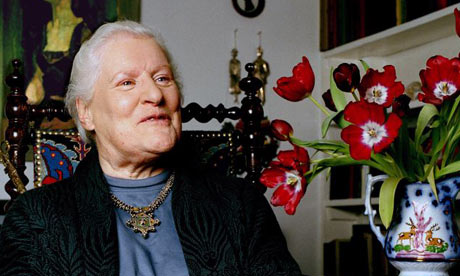
So there I was this weekend, reading, as prompted by Susan Hill's voyage around her bookshelves, Howard's End is on the Landing, an as-yet-unopened volume from my bookcase. I'd promised in my blog on Friday to begin on Nathanael West's Complete Works (I had The Day of the Locust in my sights) but in the event I came down with a cold, and felt the need for something a bit warmer. I loved Diana Athill's publishing-memoir, Stet, and her trenchant, Costa-winning foray into the farther reaches of old age, Somewhere Towards the End – her wit, brisk candour and writerly dedication to the business of "getting it right" make her the ideal companion when you need to be chivvied out from under the weather. So I picked up Yesterday Morning, in which she revisits her childhood.
Sure enough, it's a great book, effortlessly elegant; just the thing to carry you through the early hours when you're waiting for the Beecham's to kick in. Athill paints a rich picture of an early life played out in the 1920s "in the upper reaches of the middle class, and in the country", one of the latest generation of a "hunting, shooting family" that knew and liked its place in the world. But she manages to do so without indulging in any of the nostalgia-for-a-bygone-era that would make her reminiscence distasteful: rather, she offers a superbly clear-eyed analysis of her own privilege, without disingenuously apologising for, or denying the pleasure she took in, her spacious and happy childhood.
But it was, in fact, a passage towards the end of the book, when she returns to the present day and briefly considers the enthusiasms that remain with her, that really caught my eye. Books are chief among these, but "fiction these days", she says, "has to be more than well-written to hold me. Like most of the old people I know, what I am looking for is material for my own imagination to work on, rather than experience predigested by someone else into a story". She goes on to mention Alice Munro, Raymond Carver, Pat Barker, Hilary Mantel and, rather splendidly, David Foster Wallace as purveyors of the sort of fiction that achieves this for her ("'Look-at-me!' writing of the Martin Amis kind … has always left me cold").
This intrigued me for a number of reasons. Firstly, I've always subscribed to the idea that books serve different purposes for us at different points in our lives (who hasn't reread a book they first came across as a teenager and been baffled by the pleasure we took in it – or loved it just as much but for completely different reasons?), and it's oddly exciting to be offered an insight into the role it might play later in life. Secondly – this is more personal – the list of authors she mentions tallies almost directly with a list of my own favourites (Pat Barker is the only one I'd leave off) which leads me to wonder what, precisely, my reading age is. Finally, though, I was fascinated and moved by her final words on the subject. "Some of my most beloved books – those of Tolstoy and Jane Austen, for example," she says, "I have deliberately left aside for a long time because I want to come back to them once more before I die with a fresh eye."
This brought me up short. There's something deeply upsetting about the notion of someone – and one day, yourself – reaching the point where you put down Pride and Prejudice and think, well, that's the last time I'll read that. When I read a book I really love, part of the pleasure for me is the knowledge that it's not gone forever; that I'll come back to it in a couple of years' time. Recognising that a point will come where this isn't the case could well constitute the closest I've ever come to acknowledging my own mortality … Then, there's the question of which books you'd store up for a final read. I'd put Wuthering Heights in there, I think, and definitely Updike's Rabbit tetralogy, and Bruce Chatwin's On the Black Hill. If it's not too maudlin, I'd be interested to hear what you'd choose, too. Either way, I recommend Athill's Yesterday Morning heartily – whether you've read it before or not.

